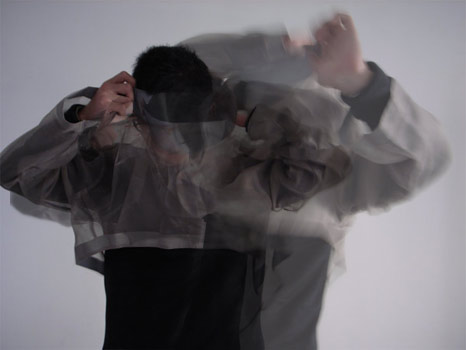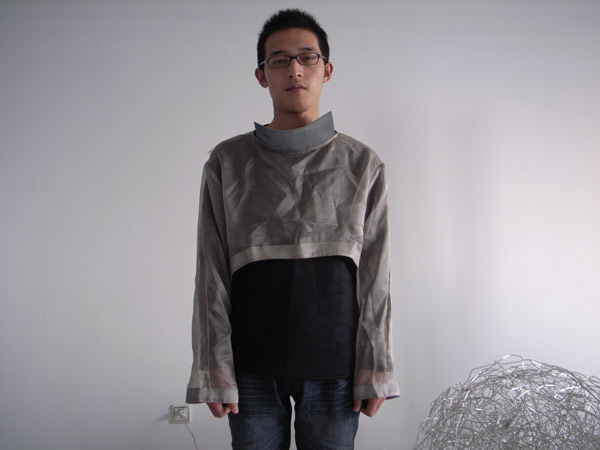To write is to permit others to conclude one’s own discourse, and writing is only a proposition whose answer one never knows. One writes in order to be loved, one is read without being able to be loved, it is doubtless this distance which constitutes the writer. (Roland Barthes)
::writing about writing, between shanghai and beijing, 2 December
today i become a writer. written self reading a purple journal like being in this airplane, oh i fucked up fucked up so many times, “it’s just that this year has been so full of small, stupid, non-descript disasters, not the big ones that could at least be identified as crisis.” sometimes in reading their words i describe my own surroundings, the small spaces around the page being written as we read others: (please fall in love with me). He is nonchalant about loose trivia on japanese aesthetics like mentioning the names of people he knows.
“The proximity of two differing individuals can become too intense.” (Arnold Barkus)
They are all your friends. And the more old friends that keep popping up in magazines, oh, we must be doing okay. And all the ones that don’t, that come up instead in cafés, in the airplane a couple rows ahead, on someone’s facebook friend list or just in my memory, well… we’re all sorry it turned out this way, we haven’t turned out at all, or against all, or we’re just turning…
so many things happened this year, i lose sight of the things that matter most.
but i’ll love you through the pages of a matte-papered magazine, and maybe that’s enough for today.
“30”, Binna Choi, from The Sole Proprietor and Other Stories, ed. Melissa Lim and Heman Chong:
Perhaps this sudden consciousness of my turning thirty has become entangled with my untamed anxiety, which stems from my own difficulty in being myself when with others. In other words, what mattered, bothered and concerned me can be summed up as my “relationality” with her, him, another me, different me, disappearing me or whatever, or the air, time, space or something. With her leaving and being. With him next to me or with him annoying me. With the density or stuffiness of air. With speed. With intensity…
I am writing about turning thirty, but in doing so, I could be seeking to deny or erase it. This piece is written in the present, about a somewhat unknown future that we are in the process of progressing towards. I hope that the significance of turning thirty will surface later on. You know, I will never be thirty – I will only be two thousand, two hundred and and seven years old next year, I bet.
Hence “writing about turning thirty” is a means of pulling myself out of the preconceived position one has as part of one’s culture or society. It is also a way for me to create an interstice for myself without deliberate avoidance of particular cultural or temporal frameworks. I am trying to prevent these aspects from governing me or my being with “others” within and outside of these frames. I want to take responsibility for my life or lives of others in mine, and ultimately grin — rather than laugh with sound — in the face of my struggles, strengths, delights – like that mad girl on a bus who glared at me as I stared back at her years ago.
Before I can reach this state that allows me to “grin”, let me pose a fundamental question: why do I write? I’d asked this same question quite a few times before, and I know that I have a problem with delving into it. Actually I even doubt that I had ever “written” in the most idealistic sense of that word. I reckon my fantasy is that writing for me is an opportunity to communicate in silence, to compose and liberate what is a part of me, be it my fascination, wonder, despair, concern, joy, beliefs, thoughts and so on — without being dogmatic. I want to believe that I make friends and love through writing.
writing having been written, between beijing and tokyo and los angeles and dallas/fort worth, 22 december
today, before leaving Beijing, it was written: “yes!”
There is no fear in that. No fear, no fear. Its beauty is impressed upon my skin as much as it distances. it was like looking again into the past. Every new realisation is also recognition of all that past in which you did not know it before! Linda didn’t get it at the time. Now she’s married and has dogs, surely she knows something we do not?
It was brought up again over dinner that that desire to cut off was as much the fear of being disconnected from. He cannot understand the difference between the cup there, or here, or there… And I thought we bought this salad. Well, you certainly didn’t buy me. But it’s the cup and the salad and the me and the you, and if we acknowledge no distinctions between any or all, how far can we go in attempt of love? Should we be left formless? Where would we go, and how would we know who we are anymore?
He reminds her that they are all connected. Of course, all these things are written into the body. Past is future is present, so just watch. I watch what i do not see: the big-eyed girl crying in secret, the small-eyed girl crying all day. I wish you could see more so that i wouldn’t have to explain anymore.
“Giorgio Agamben claims that the most important political goal is to find new ways to make the human body inoperative, in the sense that poetry makes language inoperative, to find new uses for the human body.” Would you want that I gave myself completely to you? Would you want that i agreed with everything you said, that everything that you wanted was what i wanted, too? I keep trying to think with those words, read from a monk when I was in Japan: “utmost reverence”. I try to say “yes!” too. But it’s not what I want. So please stop telling me everything you know about me. Because you don’t. And you won’t so long as your eyes stay wanting.
Posted by 丫 | more »You are watching. I am watching, too. We just don’t always see the same thing.
installation, the morning after

![]()
As creators, we can say that there is an audience for our work, whereby “public” is both an excuse and a reason. And yet as creators within a social sphere, our unabashed ability to colonialise spaces, and even publics, actually distances us from any notion of real interaction rather than that of working context-specific, conscientiously and in cohesion with those collaborating with us.![]() In the example of the bi/tri-ennial, the clearest cut form of discourse seems to lie not within the vocabulary of the host city, not within the realm of “the work” and at times hardly even within the actual processes of production. As recently overheard from an independent curator about the opening night party of the 2007 Shenzhen-Hong Kong Biennale of Architecture and Urbanism, “Well, that’s what we came for.”
In the example of the bi/tri-ennial, the clearest cut form of discourse seems to lie not within the vocabulary of the host city, not within the realm of “the work” and at times hardly even within the actual processes of production. As recently overheard from an independent curator about the opening night party of the 2007 Shenzhen-Hong Kong Biennale of Architecture and Urbanism, “Well, that’s what we came for.”![]() Chief curator of the Biennale Ma Qingyun is at a loss. “But we worked so hard…”
Chief curator of the Biennale Ma Qingyun is at a loss. “But we worked so hard…”![]() The bi/tri-ennial are event-based phenomenona, as new technology, “our latest project”, and another friday night scene. Critical exchange, then, takes a cue, as a breather after all that hard work—-at bars, the after-parties and nestled within the snide comments made during other people’s speeches. It is hard to understand what sort of feedback and interaction one can stimulate or expect from an event involving a mass public audience. “I hope they’ll collect the press clippings,” says one architect in the back of the taxi, on the way to a bar after the after-party. And yes, these traditional forms of review may still be helpful and necessary within a larger system of creative production. But the formality of a critic’s theoretical opinion or a blogger’s on-the-scene action shots bely the stagnancy of the actuality. The sponsor hotel where most exhibitors stay always makes for a much more active and dynamic space than that last exhibition hall.
The bi/tri-ennial are event-based phenomenona, as new technology, “our latest project”, and another friday night scene. Critical exchange, then, takes a cue, as a breather after all that hard work—-at bars, the after-parties and nestled within the snide comments made during other people’s speeches. It is hard to understand what sort of feedback and interaction one can stimulate or expect from an event involving a mass public audience. “I hope they’ll collect the press clippings,” says one architect in the back of the taxi, on the way to a bar after the after-party. And yes, these traditional forms of review may still be helpful and necessary within a larger system of creative production. But the formality of a critic’s theoretical opinion or a blogger’s on-the-scene action shots bely the stagnancy of the actuality. The sponsor hotel where most exhibitors stay always makes for a much more active and dynamic space than that last exhibition hall.![]() Where are the relationships between work, audience and creator within the framework of the art event? Are we merely using ideas as a way of colonialising the spectacle space? Working carries over into presentation carries over into documentation carries over into publicisation. And where again is the space for the work? Somewhere between making contacts and trying to catch hold of the installation team to get the right equipment.
Where are the relationships between work, audience and creator within the framework of the art event? Are we merely using ideas as a way of colonialising the spectacle space? Working carries over into presentation carries over into documentation carries over into publicisation. And where again is the space for the work? Somewhere between making contacts and trying to catch hold of the installation team to get the right equipment.
![]() This is not meant to bemoan the poor artist who tries to be simultaneously active in all of these areas of art production. Nor can we blame the event structure alone. But is it naïve to still long for project-based work that does not neglect the need for post-planning, responsibility and respect for the other?
This is not meant to bemoan the poor artist who tries to be simultaneously active in all of these areas of art production. Nor can we blame the event structure alone. But is it naïve to still long for project-based work that does not neglect the need for post-planning, responsibility and respect for the other?![]() Would it be possible to leave an event of this kind without a feeling of the morning-after?
Would it be possible to leave an event of this kind without a feeling of the morning-after?
your name is not here ä½ çš„åå—ä¸åœ¨
 秘秘的 what is a bit hidden these days
秘秘的 what is a bit hidden these days
 æ„Ÿè°¢… but thank you…[taken from DEADEND 总站 project | new uniforms for pedicab drivers 三轮车新工æœ, Shenzhen-Hong Biennale of Architecture & Urbanism, 深圳香港城市建ç‘åŒåŸŽåŒå¹´å±•, December 2007, 2007å¹´12月 …hk-丫-BAO]
æ„Ÿè°¢… but thank you…[taken from DEADEND 总站 project | new uniforms for pedicab drivers 三轮车新工æœ, Shenzhen-Hong Biennale of Architecture & Urbanism, 深圳香港城市建ç‘åŒåŸŽåŒå¹´å±•, December 2007, 2007å¹´12月 …hk-丫-BAO]
